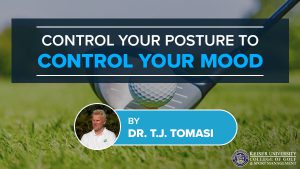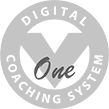Control Your Posture to Control Your Mood

By Dr. T. J. Tomasi, Keiser University College of Golf Senior Faculty and Director of Research
Now a senior player, Luke Donald was once number one in the world. When playing his best, he focused on his posture – not the golf aspects of posture, such as the position of his left foot, etc. but the psychological elements of posture. “It’s helped me to be aware of my posture and how I outwardly project that positive feeling,” Donald said. “It helps me send that message to whomever I play against.”
Dr. Richard Petty, a professor of psychology at Ohio State University, has shown that not only are golfers like Donald sending a message to others, but more importantly, they are sending a message to themselves. Much research has confirmed that body posture can affect how humans think about themselves and their actions. Petty says, “… it turns out that our posture can also affect how we think about ourselves. If you sit up straight, you end up convincing yourself by your posture.”
Studies by Paul Ekman and his colleagues have also shown a relationship between physical posture and mental states like emotions. By posturing yourself correctly, you can condition yourself to be more confident and less stressed.
Luke Donald used his caddy, Dave Alred, for feedback. “He is right there with a word when I slump my shoulders. He’s always on me about keeping the shoulders back and not getting down on myself,” he said. And it’s not just the shoulders. While everyone knows that emotions cause facial expressions, Dr. Ekman was the first to show that facial expressions can cause emotion. To do this, Ekman, a professor of psychology at the University of California, looked into a mirror to learn how to make every muscle movement of a happy face and, in so doing, discovered a most interesting effect: “… we found that making a smile produced many of the changes in the brain that occur with enjoyment,” he said.
The Takeaway: To improve your golf, you can use your facial expression to decrease distress because you can produce the emotion of happiness by smiling. To develop this skill, wait until you’re happy, then study your face in a mirror, as Dr. Ekman did. Teach yourself the exact muscle pattern of your natural smile and then when things start to spiral out of control, throw your shoulders back and smile.

And keep smiling!














